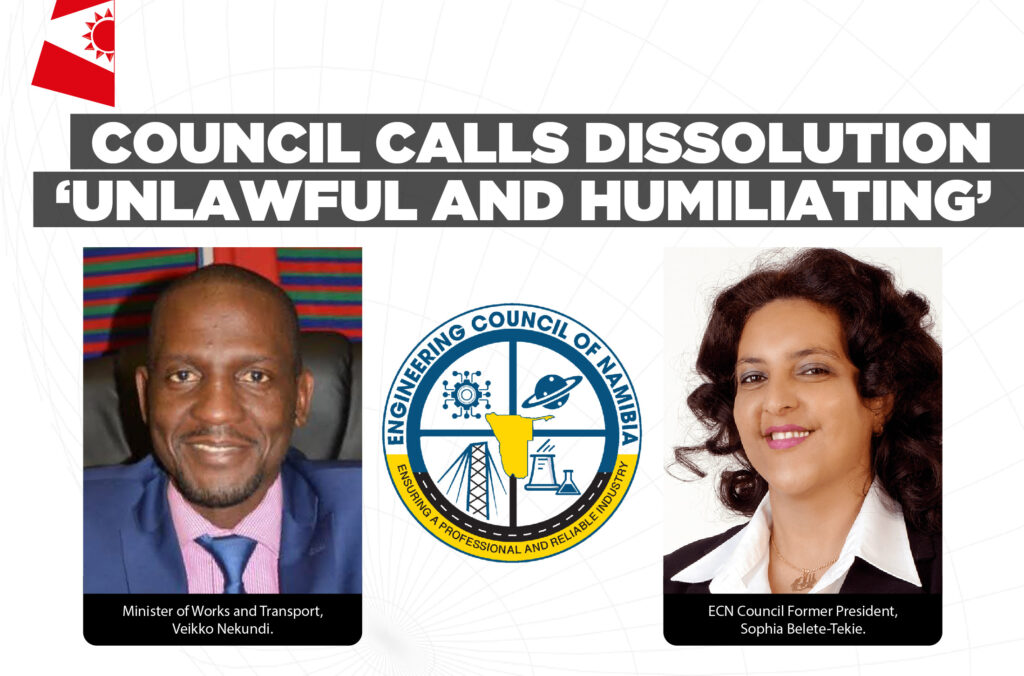By Staff Reporter
Staff Reporter
The Engineering Council of Namibia has challenged the decision by the Minister of Works and Transport, Veikko Nekundi, to dissolve the Council, describing the move as both “procedurally flawed” and “humiliating”.
“The manner in which the Ministry, through the Executive Director, communicated its intention to dissolve the Council-by routing the letter through the Registrar, who stands accused of misconduct, and allowing him to circulate it publicly on social media-was not only procedurally flawed but humiliating to the Council. It undermines both the rule of law and the principle of professional communication within government. This precedent is unprecedented in Namibia’s governance history and deeply troubling. This sets dangerous precedent for all statuary bodies,” the council’s former president, Sophia Belete-Tekie, said.
Belete-Tekie emphasised that the Council was appointed in August 2022 and constituted in accordance with the Engineering Profession Act, 1986 (Act No. 18 of 1986). She noted that the Act provides for a four-year term, unless shortened or extended by the Minister upon recommendation by the Council.
“No such recommendation was issued. The Act outlines limited legal grounds for removal, none of which were invoked. The dissolution occurred without prior notice, due process, or gazettal. Termination letters were not issued directly by the Ministry but were disseminated by the Registrar-whose conduct is the subject of multiple unresolved allegations-raising concerns of administrative irregularity,” she explained.
Belete-Tekie explained that the dissolvement of the council contravenes the explicit provisions of the Engineering Profession Act (1986, as amended in 1991), specifically section 4, which deals with the specific grounds for the removal of Council members.
She also highlighted section 5 of the Act, which stipulates that “every member of the council shall be appointed for a period of four years, but shall on termination of the period for which he was appointed, continue to hold office for a further period not exceeding three months until his successor has been appointed: Provided that the Minister may, after consideration of a relevant recommendation by the council, extend or shorten the term of office of any member or of all members of the council and their alternate members for a specified period not exceeding one year.”
According to Belete-Tekie, the dissolution of the Council is therefore in direct contravention of the Act, and the decision to proceed without properly investigating the serious allegations against the Registrar is not only unjust but also undermines the legal safeguards established by the legislation.
“The Registrar, despite facing multiple allegations, was inexplicably allowed to transmit termination notices to Council members. This role falls outside his statutory mandate, which is confined to registration functions-not executive authority. This serious deviation from the Act raises questions of legality and abuse of process. This act exceeded the registrar’s statutory function and violated principles of administrative justice,” she explained.
Belete-Tekie added that eight out of ten Council members supported the allegations against the Registrar.
“Substantial allegations against the Registrar were substantiated through Council minutes, legal briefs, disciplinary hearing records, and internal correspondence. These are not speculative, they are supported by Minutes, financial records, and swam statements,” she said.
She outlined the allegations, which include: forgery related to his claimed Professional Engineer registration; fraud and corruption involving a legal invoice from Conradie Inc., intended to compel Council members to pay a fee instead of the Council; a forged employment contract with unapproved amendments and benefits; unlawful overtime payments totalling over N$101,000; self-approved salary payments; attempts to coerce Council members into paying a potentially fraudulent fee; and irregularities in job description dates and content, including the claim that the Registrar serves as CEO of the Council.
“The dissolution of the Engineering Council of Namibia (2022-2025), carried out without addressing the extensive, substantiated allegations of misconduct-some of which border on criminality-not only violates the Engineering Profession Act but also threatens the integrity of Namibia’s professional regulatory environment. It undermines efforts to uphold public safety, educational standards, and professional ethics,” Belete-Tekie added.
